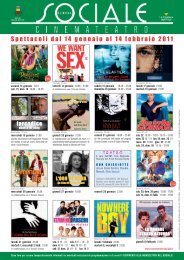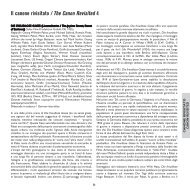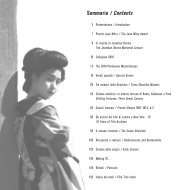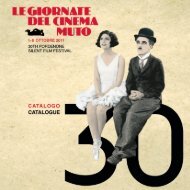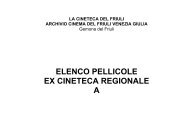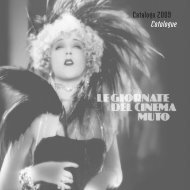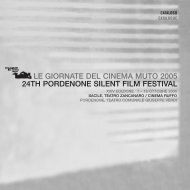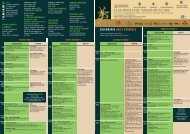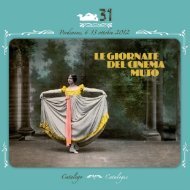Catalogo Giornate del Cinema Muto 2012 - La Cineteca del Friuli
Catalogo Giornate del Cinema Muto 2012 - La Cineteca del Friuli
Catalogo Giornate del Cinema Muto 2012 - La Cineteca del Friuli
Create successful ePaper yourself
Turn your PDF publications into a flip-book with our unique Google optimized e-Paper software.
William Neill: la proiezione anticipa le celebrazioni <strong>del</strong>l’imminente centenario <strong>del</strong>la Technicolor. L’UCLA Film & Television Archive ha magnificamente restaurato il<br />
capolavoro di Clarence Brown The Goose Woman, a partire da una copia a 16mm <strong>del</strong> film “perduto” che Kevin Brownlow scovò 54 anni or sono e che diede un<br />
impulso decisivo alla sua leggendaria passione per il cinema muto. Le riscoperte italiane di quest’anno sono il commovente Gli spazzacamini <strong>del</strong>la Val d’Aosta di<br />
Umberto Paradisi, tratto dal dramma che Giovanni Sabbatini dedicò nel 1854 alla miserevole condizione dei fanciulli spazzacamino (vittime di frequenti abusi e<br />
soprusi ancora nel 1914, quando il film fu realizzato) e Idillio infranto di Nello Mauri, uno degli ultimi film muti italiani, il “sogno di celluloide” con cui l’uomo d’affari<br />
pugliese Orazio Campanella volle celebrare l’atmosfera e la cultura <strong>del</strong>la regione natia. Ci auguriamo che Sir Sydney Samuelson possa essere con noi per presentare<br />
due film prodotti da suo padre G.B. Samuelson e diretti da Walter Summers: The Unwanted e A Couple of Down and Outs (1923), che anticipa la trama di War<br />
Horse di Spielberg. Il progetto Hans Steinhoff culmina con la pubblicazione <strong>del</strong> volume che Horst Claus ha dedicato a questo controverso regista e la proiezione <strong>del</strong><br />
più sorprendente film di Steinhoff, Familientag im Hause Prellstein. Realizzato appena sei anni prima <strong>del</strong> noto Hitlerjunge Quex, è l’adattamento di una commedia<br />
<strong>del</strong> Teatro Ebraico di Berlino, i cui interpreti – tra i quali due futuri beniamini di Hollywood, S.Z. Szakall e Sig Arno – sarebbero stati presto costretti a emigrare<br />
oppure a prepararsi al peggio in Germania. Elif Rongen-Kaynakçi presenta un’altra <strong>del</strong>le sue antologie di comiche <strong>del</strong>le origini, questa volta dedicata alla figura<br />
<strong>del</strong>la suocera, eterno bersaglio degli strali degli umoristi.<br />
Come di consueto, il Collegium porterà a Pordenone 12 nuovi giovani studiosi appassionati di cinema muto mentre a un collegian <strong>del</strong>l’anno scorso verrà assegnato<br />
il premio annuale <strong>del</strong>la Banca Popolare FriulAdria Crédit Agricole riservato al miglior “Collegium paper” – un riconoscimento vivamente apprezzato per i 14 anni<br />
di lavoro <strong>del</strong> Collegium, nel corso dei quali abbiamo visto numerosi ex collegians portare il proprio talento ed entusiasmo nel mondo accademico e archivistico.<br />
Per una volta non ci lamenteremo <strong>del</strong>le restrizioni economiche che di questi tempi colpiscono la cultura. Il problema è universale; non resta che fare quanto<br />
possibile per superarlo. Noi speriamo di riuscirci con la collaborazione dei nostri ospiti, ai quali chiediamo di capire le ragioni che stanno dietro la riduzione<br />
<strong>del</strong>l’ospitalità o l’applicazione <strong>del</strong>le quote per l’accredito.<br />
Per tutti i collaboratori <strong>del</strong>le <strong>Giornate</strong> quest’anno è stato dolorosamente segnato dalla scomparsa di Sara Moranduzzo. Entrata a far parte <strong>del</strong>le <strong>Giornate</strong> nel<br />
1995, quando fu allestita la mostra per il centenario <strong>del</strong> cinema, Sara nel corso degli anni era diventata una presenza indispensabile nelle pubbliche relazioni; in<br />
particolare, si era prodigata per rafforzare i legami tra il festival, la città e le istituzioni regionali. Nel momento in cui rendiamo omaggio a Charles Dickens, uno<br />
scrittore da lei molto amato, Sara, con la sua generosa vitalità e il suo humour, ci manca più che mai. – LIVIO JACOB, DAVID ROBINSON<br />
It is an axiom of film festivals that if the programme is not better than last year’s – it is worse. We have no such fears for our 31st programme; and when we assert<br />
that it offers more exciting rediscoveries and surprises than ever before, it is no boast on our own part, since the credit is due not to us, the <strong>Giornate</strong> team. All<br />
is thanks to our friends and essential supporters, those international film archives who have generously given their time, research, and films to make the festival<br />
possible, and those who have dedicated themselves to curating the different sections, and contributing to writing this catalogue.<br />
The Cinémathèque française has granted us the première of a momentous rediscovery, the 1902 Les Aventures de Robinson Crusoé, in many respects the most<br />
beautiful film by Georges Méliès that has re-emerged since his rehabilitation began more than 80 years ago. Equally, we have been granted the absolute premiere<br />
of the remarkable restoration of Phono-Cinéma-Théâtre, one of the wonders of the 1900 Paris Exposition Universelle. The Cinémathèque française and Gaumont,<br />
in association with Lobster Films, have recovered and restored practically the entire repertoire, including seven of the ten films which originally had synchronized<br />
sound, recorded on phonograph cylinders. The result is not just a historical curiosity, but a living record of the greatest stage stars of the Belle Époque, including<br />
Bernhardt, Coquelin ainé, and Réjane; the étoiles of the ballet, Mauri, Zambelli, and Cléo de Mérode; and outstanding figures of the opera, operetta, and music hall.<br />
Talent, we discover, doesn’t fade: after 12 years, this is still an all-star show.<br />
Robinson Crusoe constitutes the first item of the opening musical serata, composed and conducted from the piano by Maud Nelissen. The feature film that follows<br />
is King Vidor’s The Patsy, with the incomparable Marion Davies confronted by the formidable Marie Dressler. The closing gala will be Clarence Brown’s A Woman<br />
of Affairs, starring Greta Garbo and John Gilbert, with the theatrical premiere of Carl Davis’s score, conducted by the composer himself. Our third major musical<br />
presentation is a spectacular innovation for the <strong>Giornate</strong>: Dreyer’s <strong>La</strong> Passion de Jeanne d’Arc will be performed in the Duomo of Pordenone, with a new score by<br />
Touve Ratovondrahety, composed for the Duomo’s superb historic 1749 organ, chorus, solo cello, three trumpets, and two trombones. The musicians are all from<br />
the renowned Coro San Marco and Orchestra San Marco of Pordenone, thus fulfilling the festival’s constant ambition to integrate its international role with the<br />
cultural life of the city. This wish will be further achieved by the greater involvement of students from the regional musical institutions in the Festival’s annual<br />
Masterclasses in film accompaniment, this year celebrating their 10th anniversary. As usual our resident musicians will work daily with two gifted guest pianists,<br />
and these Masterclasses can be recommended as one of the best shows in town, offering remarkable insights into film interpretation. An especially valued civic<br />
collaboration, now established as a popular annual tradition, is the Sunday afternoon comedy film show accompanied by Pordenone schoolchildren.<br />
The festival’s major programme strand is “Dickens, Father of the Screenplay,” marking the bicentenary of the British novelist’s birth and bringing together the<br />
largest collection yet assembled of silent film adaptations of his works. We present the first complete retrospective of the silent films of the mesmeric Anna Sten,<br />
4<br />
a Russian actress whose unique qualities were to be eclipsed when Hollywood set out to transform her into a star. Further exploring the pioneering American studios<br />
often neglected in official history, we offer a selection of the surviving productions of Selig Polyscope. The new biography by Andrew Erish, who has curated the<br />
programme, is justly titled Col. William N. Selig, the Man Who Invented Hollywood. Among his lifetime of innovations, Selig built the first studio in Los Angeles,<br />
was the first to film Westerns on real locations with real cowboys and Indians, made America’s first two-hour feature (The Spoilers), created the first American<br />
newsreel, inaugurated the serial, and launched stars like Tom Mix and Kathlyn Williams.<br />
To the British Silent Film Festival we owe the rediscovery of the series of adaptations of the short stories of W.W. Jacobs – “the O. Henry of the Waterfronts”<br />
– made early in the 1920s by the director-writer team of Manning Haynes and Lydia Hayward. Very English in their deceptively gentle, sharply ironic humour,<br />
they are exemplary in structure and their use of location and character – and irresistibly enjoyable. To follow last year’s programmes of Japanese animation, we<br />
present two programmes of German animation of the silent period, which bring to light unknown talents, many working in the advertising sector, rather than the<br />
well-known art and avant-garde animators. The early cinema programme includes the earliest-known Dickens adaptations, rediscoveries by Méliès and Velle, and<br />
a further selection from the riches of the Corrick Collection – even now not exhausted: we can offer yet another selection in 2013. Besides <strong>La</strong> Passion de Jeanne<br />
d’Arc, the fourth annual selection of “The Canon Revisited” sets new restorations of familiar classics like Pabst’s Joyless Street alongside less-known masterworks<br />
like Friedrich Zelnick’s Die Weber.<br />
This year’s “Rediscoveries and Restorations” section could be a festival in itself, featuring, for a start, three major restorations. Herbert Brenon’s The Spanish<br />
Dancer has long been known only in cut-down and hardly comprehensible versions. Now, restored by EYE Film Institute, we can appreciate why it was regarded as<br />
the wonder film of 1923. Warner Bros. have made a new print of Roy William Neill’s The Viking specially for the <strong>Giornate</strong> screening: the serata screening anticipates<br />
a planned programme to celebrate the coming centenary of Technicolor. The UCLA Film & Television Archive provide a magnificent restoration of Clarence Brown’s<br />
masterpiece The Goose Woman, largely established from the 16mm print of the “lost” film which Kevin Brownlow found 54 years ago, and which was one of the<br />
impacts which inspired his legendary dedication to silent cinema.<br />
This year’s Italian rediscoveries are Umberto Paradiso’s supremely moving The Chimney Sweepers of the Valley of Aosta, based on Giovanni Sabbatini’s 1854 play<br />
about the plight of child chimney sweepers – an abuse still current when the film was made in 1914; and Nello Mauri’s Idillio infranto (Broken Idyll), one of the<br />
last Italian silent films, the “celluloid dream” of a Pugliese businessman, Orazio Campanella, who wanted to celebrate the atmosphere and culture of his native<br />
Puglia. We hope that Sir Sydney Samuelson will be with us to introduce two films produced by his father G.B. Samuelson and directed by Walter Summers – The<br />
Unwanted and A Couple of Down and Outs (1923) – a contemporary anticipation of the story of War Horse. The Hans Steinhoff project climaxes with the publication<br />
of Horst Claus’ definitive book on this most controversial director and the screening of Steinhoff’s most surprising film: Familientag im Hause Prellstein, made only<br />
six years before the notorious Hitlerjunge Quex, was an adaptation of a play from the Berlin Jewish Comedy Theatre, with a cast – including the future Hollywood<br />
favourites S.Z. Szakall and Sig Arno – who were soon to emigrate or suffer worse fates in Germany. Elif Rongen-Kaynakçi presents another of her anthologies of<br />
early comedies – this time dedicated to the eternal joke of the Mother-in-law…. And much more. We are obliged to offer a warning to guests that this year’s<br />
programme is brutally demanding: there is nothing that may safely be skipped.<br />
The Collegium will as usual bring to Pordenone 12 new young scholars and enthusiasts of silent film; and one of last year’s collegians will be selected for the annual<br />
Award presented by the Banca Popolare FriulAdria Crédit Agricole, for the year’s best Collegium Paper – a greatly appreciated recognition of the Collegium’s 14<br />
years of work, which have seen many former collegians go on to bring enthusiastic new talents to the archival and academic worlds.<br />
Finally, we shall not lose energy complaining about the predictable current economic restraints on culture. The problem is universal; the challenge is to overcome<br />
it in the best way we can. We hope we are achieving this, despite tough budget cuts, with the collaboration of our guests who – generally willingly and generously<br />
– share part of the burden, whether as patrons, or in understanding the need for higher accreditation charges and more restricted hospitality. We hope that all our<br />
guests agree that the Festival offers enough to deserve this degree of extra support.<br />
The year has inevitably been shadowed for everyone working at the <strong>Giornate</strong> by the early death of Sara Moranduzzo. Sara joined the <strong>Giornate</strong> 16 years ago to work<br />
on our Centenary of <strong>Cinema</strong> exhibition, and over the years had become a vital personality in the work of public relations, in particular always striving to consolidate<br />
the links between the Festival and the city. One of her favourite authors was Charles Dickens. Pordenone will greatly miss her vital and always endearing presence.<br />
5<br />
LIVIO JACOB, DAVID ROBINSON



